Institutes
May 21, 2019
Summit Focuses on Treatment Concerns for Opioid Abusers
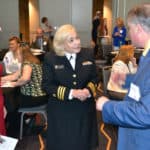
Representatives from a number of health-care organizations, academic facilities and governmental agencies attended a meeting May 17 at Little Rock’s Robinson Center designed to bring attention to treatment options for those dealing with opioid use disorder. The Medication Assisted Treatment for Opioid Use Disorder Treatment Summit, sponsored by the Partnership for a Healthy Arkansas, featured…
May 20, 2019
Thoracic Surgeon Steliga Honored by UAMS Cancer Institute Auxiliary
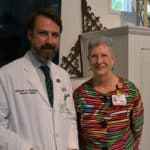
When Matthew Steliga, M.D., arrived at UAMS 10 years ago, he faced an uphill battle. Lung cancer rates in the state were skyrocketing, with an estimated 2,160 Arkansans losing their lives to the disease in 2009 alone. As UAMS’ only surgeon dedicated to the treatment of lung cancer, Steliga jumped in headfirst and began building…
May 15, 2019
UAMS Cancer Institute Bone Marrow Transplant Program Receives Internationally Recognized Accreditation
The Bone Marrow Transplant Program at the University of Arkansas for Medical Sciences (UAMS) has received an internationally recognized accreditation by the Foundation for the Accreditation of Cellular Therapy (FACT).
May 8, 2019
Community Scientist Academy Graduates First High School Class
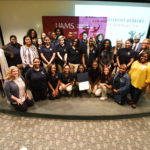
Shanell Young, a senior at Little Rock Parkview, wasn’t sure what to expect during the spring 2019 UAMS Translational Research Institute Community Scientist Academy. After receiving her graduation certificate at a UAMS ceremony, she went to the lectern to share her takeaways. “What people actually refer to as research nowadays is really just googling,” she…
Cancer Researchers Form Collaborations, Share Insight at Inaugural Retreat
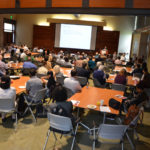
With about 125 cancer researchers and clinical scientists gathered in one spot, new ideas and collaborations are bound to develop.
May 7, 2019
Johann Granted $1.47 Million to Continue Cutting-Edge Lung Cancer Clinical Trials
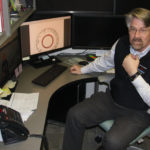
What will lung cancer diagnosis and treatment look like in the future? Look no further than the research happening today at UAMS. “We’re coming into the long-promised ‘future’ of cancer treatment,” said physician-scientist Donald J. Johann Jr., M.D. “For the last 50 years, the holy grail of cancer research has been being able to detect…
May 6, 2019
Florida-based Friendship Transcends, Through Sickness and Health
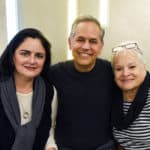
A Facebook friendship that formed over an illness in common proved lifesaving for a Florida man who found what he needed at the UAMS Myeloma Center. Myeloma Center patient Gail Naimo of Port St. Lucie, Fla. met fellow Floridians Sergio Pinango, 56, and his wife, Blanca Nieto, 50, on a myeloma Facebook page five years…
May 3, 2019
FCC Commissioner Impressed by UAMS Digital Health Initiatives
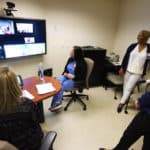
UAMS’ pioneering work in bringing health care to those who need it through digital health applications has drawn the attention of a top federal official who traveled from Washington D.C. to UAMS recently to see for herself. Jessica Rosenworcel, a commissioner on the Federal Communications Commission, visited April 29 with UAMS Chancellor Cam Patterson, M.D.,…
May 2, 2019
Study May Bring Options for Children with Tourette Syndrome

Barrett McAlister hopes an ongoing clinical trial at UAMS can help establish a new treatment for Tourette syndrome in children so they can focus on being kids, playing and learning, without worrying about being “different.” “If they’ve got a chance at a normal life, I say take it,” McAlister said. “Take it with both hands.”…
April 29, 2019
Woman Relaxed for First Time in Years After Complex Spine Surgery

Last fall, just getting out of a chair and walking from one room to the next was a labored and painful experience for Denise Frerichs. The pain was excruciating and it ran down from her back to her legs. “The pain started about two years ago. At first I thought it would get better. I…
Previous page Next page